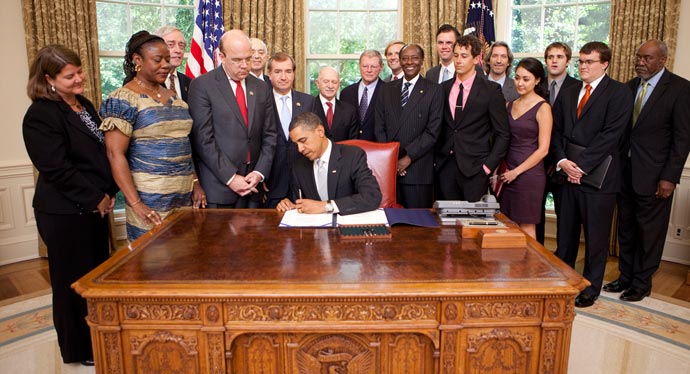
Last week, President Obama announced that his administration is sending U.S. military advisors to assist in regional efforts to end the almost 25 year-old crisis caused by the Lord’s Resistance Army, or LRA. The news made a splash in the headlines and prompted the chair of House Foreign Affairs to call a full committee hearing, currently slated for next Tuesday, to discuss the deployment.
The White House’s move has renewed attention to the LRA crisis in a potentially game-changing way. Taken together with the current negotiations over a possible new African Union-led mission to stop the rebel group, we could be witnessing a turning point in the way the international community addresses this brutal group – hopefully leading to its demise once and for all.
The Enough Project released a report today that I wrote with John Prendergast that hones in on what it will take for these current initiatives to accomplish what we hope: One, to get capable special forces on the ground in Central Africa that are up to the task of confronting ruthless rebel fighters, along with the necessary intelligence and logistical capabilities. And two, to bolster efforts to protect civilians – not only to fulfill the moral imperative and responsibility to protect the innocent, but to ensure that the LRA cannot replenish its ranks through abductions.
Regional efforts to apprehend the LRA senior leadership, protect civilians, and promote defections are largely at a standstill, due largely to a lack of capable and committed forces in LRA-affected areas and the requisite intelligence and logistical capabilities. A robust African-U.S.-European partnership would transform current efforts and enhance the contribution of the U.S. military advisors. Specifically, appropriately trained special forces should come from an African or other country; the U.S. would provide intelligence and logistical support, and additional logistical assistance could come from European and other countries. The U.S. military advisors should assist in developing and coordinating a more targeted and effective strategy for apprehending LRA senior leaders and protecting civilians, as well as improve oversight of the mission planning and execution. Ultimately, getting the right forces and support on the ground hinges on the involvement of President Obama, who would need to directly engage with his counterparts to secure their support.
Another potentially critical development is the proposed African Union mission. The plans being finalized would include regional military operations and an A.U. special envoy for the LRA. The mission could provide a multilateral and African partner for a surge of commitment and resources from the U.S. and other countries. However, there are several problems with the A.U. mission as currently proposed, namely:
- Without a surge of U.S. diplomacy and resources, and the engagement of additional partners, the mission is simply a new face for the same faltering efforts.
- However, instead of enhancing the existing operations, the current plans for the A.U. mission appear more concerned with continuing the status quo while attracting funding for the regional governments via the A.U.
- Some governments involved, primarily Uganda, are attempting to weaken the proposed A.U. special envoy position—a post that could invaluably address the intraregional tensions that have inhibited cooperation and coordination on addressing the LRA crisis—and the A.U.’s overall ownership of the mission.
The U.S. and other partners should engage vigorously with partners in and outside of the region to ensure that the emerging mission will be effective, but regardless of whether the African Union mission becomes the effort to back, the United States should also:
- Amend its “Rewards for Justice” program to include incentives for information leading to the apprehension of the LRA senior leaders;
- Make the LRA a central part of the mandate for a U.S. special envoy for Africa’s Great Lakes region; and
- Ensure that civilian protection and efforts to disarm, demobilize, and reintegrate LRA fighters are better integrated with apprehension efforts. (A key lesson from military operations against the LRA, including Operation Lightning Thunder under the previous U.S. administration, is that the consequence of botched operations without clear protection arrangements is reprisal attacks on civilians.)
With Kony reportedly back in the remote and lawless eastern Central African Republic and attempting to regroup, the already dire crisis is likely to deteriorate unless a dramatically new strategy is pursued.
The American public, particularly college and high school students, and Congress broadly support the Obama administration to fulfill the intent behind the landmark LRA bill signed into law by President Obama in May 2010. If his administration, in partnership with other countries and the African Union, acts swiftly to contribute the diplomatic, military, and intelligence assets envisioned within its LRA strategy, this crisis can indeed be brought to an end.
Photo: Surrounded by advocates, President Obama signed the LRA bill in May 2010 (White House)

